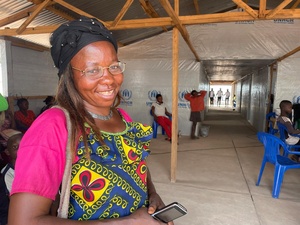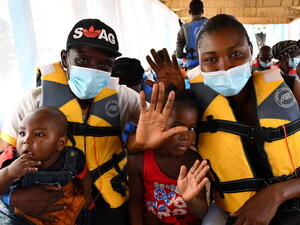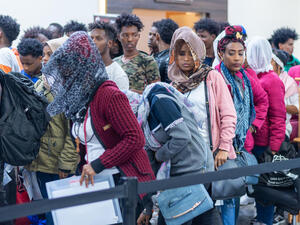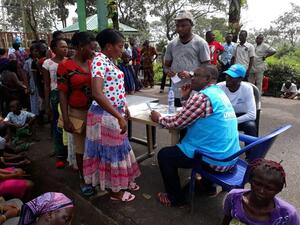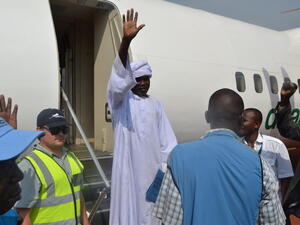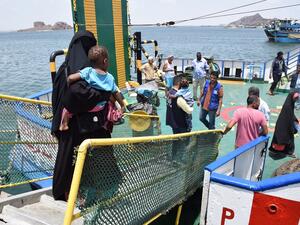Some 17,000 people return home in district of conflict-ravaged North Kivu
Some 17,000 people return home in district of conflict-ravaged North Kivu
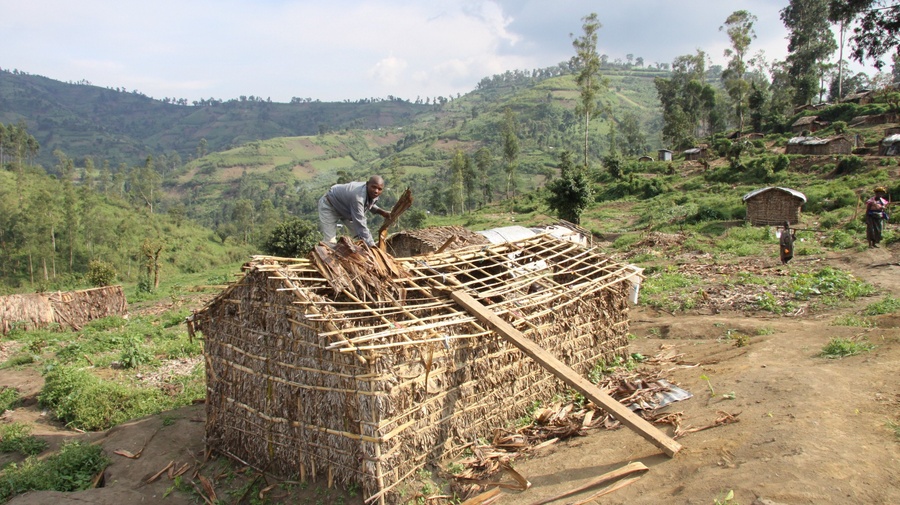
Homeward Bound: Aimable dismantles the shelter that has been his home for a year.
KANYATSI, Democratic Republic of the Congo, May 12 (UNHCR) - At the foot of rolling hills in North Kivu's Masisi district, a 15-year-old boy began dismantling the simple shelter of leaves and sticks that had been his home for more than a year.
Aimable was preparing to finally rejoin his family in his home village of Muwundu, located 30 kilometres to the east in this volatile Great Lakes province of the Democratic Republic of the Congo (DRC).
He was one of around 17,000 internally displaced Congolese civilians who have returned home spontaneously in Masisi district, northwest of the provincial capital of Goma, since the government forged a peace agreement on March 23 with the National Congress for the Defence of the People (CNDP). The site for displaced people at Kanyatsi village, where Aimable lived, is almost empty.
It was the eruption of fighting between the army and the CNDP, an armed militia-turned-political party, that forced Aimable and tens of thousands of others to flee their homes in the first place.
Aimable, who was 14 at the time, got separated from his family during the flight from Muwundu. "I arrived here in Kanyatsi village, but I could not see my mother or brothers," he told recent UNHCR visitors, before heading back home for a joyful reunion with his kin.
"I could not believe I was alone," the teenager said. But he soon realized that he would have to fend for himself. He farmed the land for host families and made enough money to build his own shelter and attend the local school. "I paid the school fees and bought clothes and domestic items for my daily needs," he explained.
Kanyatsi is located 65 kilometres north of Goma, but only 35 kms south-east of the town of Kitchanga, a stronghold of the CNDP. Some of those returning home spontaneously are doing so because UN peace-keepers are leaving the area and the civilians feel exposed. Only a few dozen, mainly the elderly, are staying here.
Aimable did not join the immediate rush of people heading home because he wanted to find out if his family was safe. When he heard they were in Muwundu, he knew it was time to go. "I am taking the leaves to roof my new house in my village," he explained as he rolled up the banana leaves that covered his shelter.
But while return to home areas is a welcome development, it can also lead to disputes over land. Host families in Kanyatsi fear this could be an issue when former residents, who fled the village to escape past conflict, decide to return.
UNHCR is developing initiatives on housing, land and property in areas of return - such as the towns of Masisi and Kitchanga - for uprooted families, including the internally displaced and refugees. These are aimed at peacefully resolving disputes and at ensuring that the displaced get access to land.
Also in Masisi District, the UN refugee agency has begun registering spontaneous returnees and the internally displaced in the town of Kilorirwe. The centre will help ascertain numbers and areas of return, and help settle land issues.
Ibrahima Coly, head of the UNHCR sub-office in Goma, said that while tension remained in much of North Kivu and hundreds of thousands remained displaced, there were encouraging signs of a return to normalcy in parts of Masisi. The economies of Kitchanga and Masisi, for instance, have begun to pick up, while reports of extortion and harassment of civilians have declined.
Aimable and others like him hope that the pattern is maintained and that real peace will return to their corner of Africa after years of misery and hardship. He wants the family reunion to last, and he also wants to put his education to good use.
David Nthengwe in Kanyatsi, Democratic Republic of the Congo


